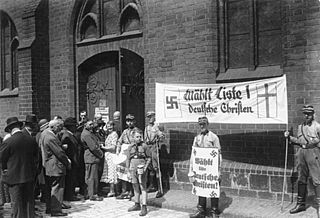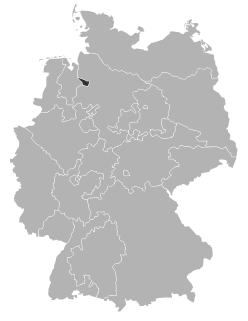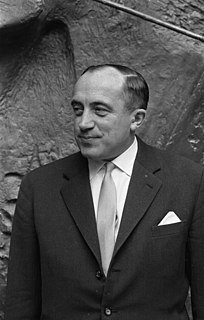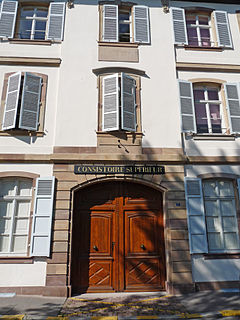
The Evangelical Church in Germany is a federation of twenty Lutheran, Reformed (Calvinist) and United Protestant regional churches and denominations in Germany, which collectively encompasses the vast majority of Protestants in that country. In 2020, the EKD had a membership of 20,236,000 members, or 24.3% of the German population. It constitutes one of the largest national Protestant bodies in the world. Church offices managing the federation are located in Hannover-Herrenhausen, Lower Saxony. Many of its members consider themselves Lutherans.

The Lutheran World Federation is a global communion of national and regional Lutheran denominations headquartered in the Ecumenical Centre in Geneva, Switzerland. The federation was founded in the Swedish city of Lund in the aftermath of the Second World War in 1947 to coordinate the activities of the many differing Lutheran churches. Since 1984, the member churches are in pulpit and altar fellowship, with common doctrine as the basis of membership and mission activity.

The Evangelical Lutheran Church in Tanzania (ELCT) is the federation of Lutheran churches in Tanzania and one of the largest Lutheran denominations in the world, with more than 6 million members, or 13% of the Tanzanian population. It is the second largest Lutheran church in the world and the largest Lutheran church in East Africa.

The German Evangelical Church was a successor to the German Evangelical Church Confederation from 1933 until 1945.

The Independent Evangelical-Lutheran Church is a confessional Lutheran church body of Germany. It is a member of the European Lutheran Conference and of the International Lutheran Council (ILC). The SELK has about 33,000 members in 174 congregations. The seat of SELK is in Hanover.

The term Evangelical Catholic is used in Lutheranism, alongside the term Augsburg Catholic, with those calling themselves Evangelical Catholic Lutherans or Lutherans of Evangelical Catholic churchmanship stressing the catholicity of historic Lutheranism in liturgy, beliefs, practices, and doctrines. Evangelical Catholics teach that Lutheranism at its core "is deeply and fundamentally catholic". The majority of Evangelical Catholic Lutheran clergy and parishes are members of mainstream Lutheran denominations.

Lutheranism is present on all inhabited continents with an estimated 81 million adherents, out of which 74.2 million are affiliated with the Lutheran World Federation. A major movement that first began the Reformation, it constitutes one of the largest Protestant branches claiming around 80 million out of 920 million Protestants, The Lutheran World Federation brings together the vast majority of Lutherans, the second largest the International Lutheran Council with 7.15 million lutherans in 46 countries. Apart from it, there are also other organisations such as the Confessional Evangelical Lutheran Conference, as well as multiple independent Lutheran denominations.

The Evangelical-Lutheran Church of Hanover is a Lutheran church body (Landeskirche) in the northern German state of Lower Saxony and the city of Bremerhaven covering the territory of the former Kingdom of Hanover.

Margot Käßmann is a Lutheran theologian, who was Landesbischöfin (bishop) of the Evangelical-Lutheran Church of Hanover in Germany. On 28 October 2009, she was elected to lead the Evangelical Church in Germany, a federation of Protestant church bodies in Germany. She stepped down from both offices on 24 February 2010 following a drunk-driving incident. After serving as an "Reformation Ambassador" for the 500th anniversary of Reformation, she retired in 2018.

The Evangelical Church of Bremen is a United Protestant member church of the Evangelical Church in Germany in the Free Hanseatic City of Bremen.

The Evangelical Lutheran Church in Brunswick is a Lutheran church in the German states of Lower Saxony and Saxony-Anhalt.
Protestants in Ukraine number about 600,000 to 700,000 (2007), about 2% of the total population. Nearly all traditional Protestant denominations are represented in the country. According to Christianity Today magazine, Ukraine has become not just the "Bible Belt" of Eastern Europe, but a "hub of evangelical church life, education, and missions". At present, the country is a key supplier of missionaries and a center of evangelical training and press printing for all the countries of the former Soviet Union, where the legal environment is not so favourable.

Werner Dollinger was a German politician and economist, a member of the Christian Social Union in Bavaria (CSU). He served as Federal Minister for the Treasury from 1962 to 1966, Federal Minister for Economic Cooperation in 1966, Federal Minister for Post and Telecommunications from 1966 to 1969, and as Federal Minister of Transport from 1982 to 1987.
The Communion of Protestant Churches in Europe is a fellowship of over 100 Protestant churches which have signed the Leuenberg Agreement. Together they strive for realizing church communion, especially by cooperation in witness and service to the world. Prior to 2003 the CPCE was known as the "Leuenberg Church Fellowship".

The Lutheran Church of the Redeemer is the second Protestant church in Jerusalem. It is a property of the Evangelical Jerusalem Foundation, one of the three foundations of the Evangelical Church in Germany (EKD) in the Holy Land. Built between 1893 and 1898 by the architect Paul Ferdinand Groth following the designs of Friedrich Adler, the Church of the Redeemer currently houses Lutheran congregations that worship in Arabic, German, Danish, and English. The Church, together with the adjoining provost building, is the seat of the Provost of the German Protestant Ministries in the Holy Land. It also serves as the headquarters of the Bishop of the Evangelical Lutheran Church in Jordan and the Holy Land, since this Arabic-speaking (Palestinian) church became independent from the German provost in 1979.

The Evangelical-Lutheran Mission in Lower Saxony or ELM is a German Protestant mission organisation.

Ralf Meister is a German Lutheran theologian, former General Superintendent of Berlin, and Landesbischof of the Evangelical-Lutheran Church of Hanover.
The Confederation of Protestant Churches in Lower Saxony is the union of the five regional Protestant churches located in the Lower Saxony. The confederation meets only tasks assigned to it by the national churches. It represents the interests of Protestant regional churches towards the state of Lower Saxony.

In Protestant usage, a consistory designates certain ruling bodies in various churches. The meaning and the scope of functions varies strongly, also along the separating lines of the Protestant denominations and church bodies.















